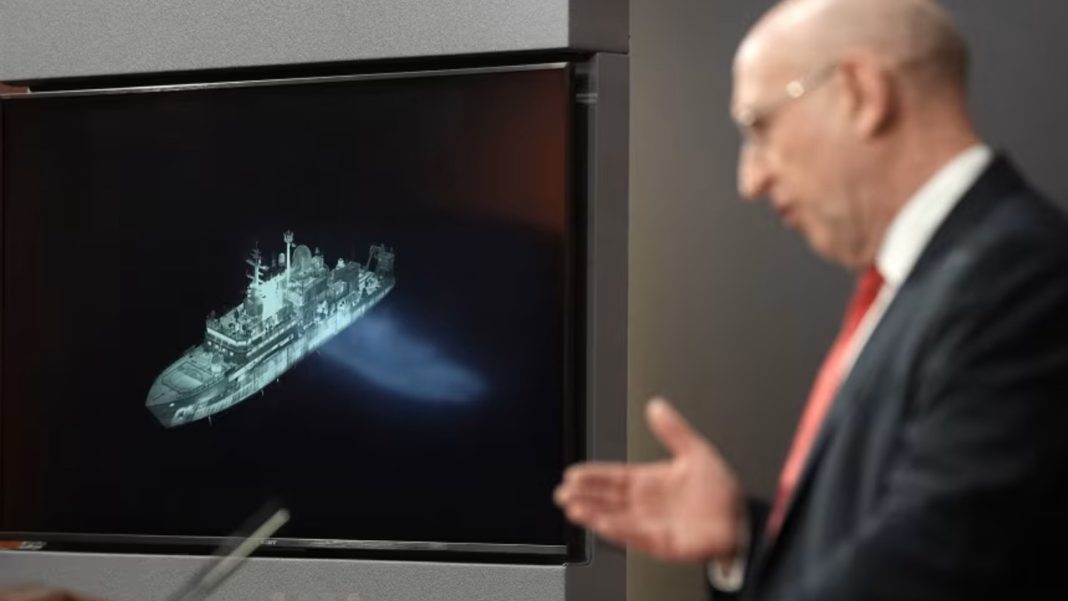In a tense escalation that underscores the fragile nature of global security, the United Kingdom has issued a stark warning to Moscow following an alleged incident involving a Russian intelligence-gathering vessel. Reports indicate that a Russian spy ship deliberately aimed lasers at UK military aircraft pilots in international airspace, prompting a swift and forceful rebuke from London. The incident, while not an act of direct combat, represents a dangerous and provocative manoeuvre in the ongoing geopolitical chess match between Russia and the West, reigniting concerns about professional conduct and the adherence to international norms in an increasingly volatile world.
The Incident and London’s Firm Rebuke
The alleged incident, which came to light through statements from UK Defence Secretary Grant Shapps, involved a Russian intelligence-gathering vessel targeting British military aircraft operating in international waters and airspace. While specifics regarding the exact location or the type of aircraft involved have been kept under wraps for operational security reasons, the implications are clear: the use of lasers against aircraft poses a significant risk to pilot safety and operational integrity. Lasers, especially military-grade ones, can cause temporary blindness, disorientation, and even permanent eye damage, making such actions incredibly reckless.
Shapps’ message to Putin was unequivocal: “We see you.” This strong declaration, echoed across diplomatic channels, served as a direct challenge to what the UK perceives as an unprofessional and dangerous act. The UK has warned that such provocations will not go unnoticed and that Russia must cease these aggressive tactics. This incident is not isolated; it occurs against a backdrop of heightened tensions, particularly since Russia’s full-scale invasion of Ukraine, and a long history of what Western nations describe as Russian “grey zone” operations – actions that fall below the threshold of open warfare but are designed to test boundaries and intimidate adversaries. The UK’s response emphasizes the importance of maintaining international standards of conduct, especially in shared operational environments.
Geopolitical Undercurrents and the Grey Zone of Engagement
The alleged laser targeting is more than just a dangerous stunt; it is symptomatic of deeper geopolitical friction and Russia’s broader strategy to challenge Western dominance and assert its presence in critical regions. Such actions fall squarely within the “grey zone” of conflict, where state actors engage in coercive activities that stop short of overt military aggression but are designed to destabilize, provoke, or gather intelligence. This strategy allows nations to test responses, probe weaknesses, and project power without triggering a full-scale military confrontation.
For Russia, such incidents serve multiple purposes: they demonstrate its operational capabilities, send a message of defiance to NATO and its allies, and potentially gather intelligence on adversary responses and tactical procedures. However, they also carry the inherent risk of miscalculation, which could inadvertently escalate tensions beyond repair. International law, particularly the United Nations Convention on the Law of the Sea (UNCLOS), dictates rules of conduct for vessels and aircraft in international waters and airspace, emphasizing the need for safety and professionalism. Deliberate endangerment of military personnel, even through non-lethal means like lasers, is a grave breach of these expected norms.
Commenting on the broader implications, UK Defence Secretary Grant Shapps asserted, “This kind of behavior is dangerous and utterly unprofessional. Russia must cease its provocative acts.” This sentiment is widely shared among Western allies, who view these actions as part of a pattern of Russian behaviour aimed at undermining the rules-based international order.
India’s Balanced Perspective on Global Stability
For India, a nation deeply invested in a stable and rules-based international order, such incidents are viewed with considerable concern, even if they occur far from its immediate borders. India maintains a complex and carefully balanced relationship with both Russia and Western powers. While New Delhi has historically relied on Moscow for a significant portion of its defence equipment and energy needs, it also shares burgeoning strategic partnerships with Western nations, including maritime security dialogues and economic cooperation.
India’s foreign policy has consistently advocated for de-escalation of tensions, adherence to international law, and peaceful resolution of disputes. The principle of freedom of navigation and overflight, crucial for India’s own maritime trade and security interests, is paramount. Incidents involving the deliberate endangerment of military personnel, irrespective of the nations involved, underscore the fragility of global peace and the potential for unintended consequences. As a rising global power, India watches such events closely, understanding that a breakdown of international norms in one region can have ripple effects on global supply chains, energy security, and regional stability, all of which directly impact India’s strategic interests.
The alleged laser targeting by a Russian spy ship on UK military pilots is a sobering reminder of the persistent and evolving nature of geopolitical tensions. It highlights the increasingly blurred lines between peace and conflict, where non-lethal weapons and grey zone tactics are employed to test resolve and project power. While the immediate focus remains on de-escalation and adherence to international conduct, the incident serves as a critical warning shot, urging the global community, including nations like India, to continue advocating for dialogue, transparency, and respect for the established norms that underpin international stability. The need for clear communication and avoidance of miscalculation has never been more vital to prevent isolated incidents from spiralling into broader confrontations.




